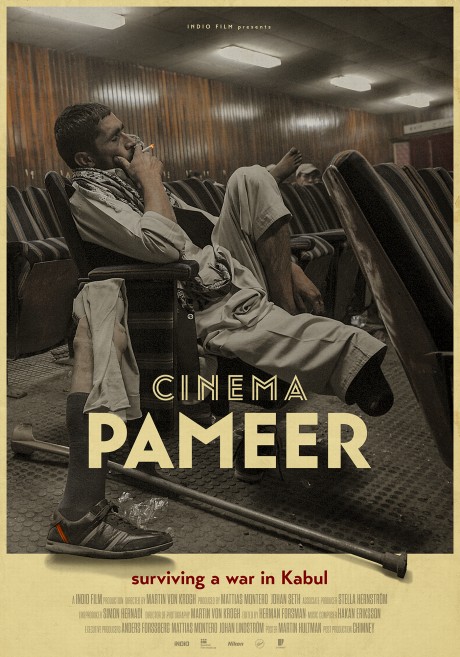


Martin von Krogh: Cinema Pameer

«Attention! The cinema belongs to all of us. Please help us maintain the cinema by taking care of it. Keep it clean…” Cinema Pameer is in Kabul, Afghanistan. “Come on in, the film is about to start”. Two voices, two different employees of this rare place in a country, where there was no films shown during the years of Taliban.
The first belongs to the General, as he is called, Dagarwal, who tries his best to have the audience behave – no hashish, no smoking at all, keep quiet during the film etc. He has – like all of them actually, salute to the Swedish director – charisma, he is quite a character, who has opinions about what he sees as a lost generation of illiterate youngsters after the many dark years. The influence from Taliban and Daesh is still there. The second voice belongs to Naqib, the barker who invites people in the street to go and see a film, and who sells water and candies during the screenings. That are well attended, the film shows. His personal story is terrible: „They poured boiling oil over the left side of my face, that’s why I am wearing a hat to hide that I lost an ear“.
„Cinema Pameer“ is a good film with a deep respect for the people working in the cinema. A film that also brings the audience outside to the streets of Kabul, to the Afghan Film, that is the governmental institution performing censorship of the films, that are imported from Pakistan as well as Afghan films to be shown. Nafiza, the only woman in the film, works there, she loves films and explains calmly what kind of scenes, she wants to be taken out before public screening – more daring dancing scenes for instance. Noor Aqa is the boss who buys the films for the cinema, like all of them he hopes that entertainment and culture can be rebuilt in the scarred country.
The two, however, whose dedication to their jobs you fall for, totally, are Said, the manager, and Ewaz, the projectionist. Said, chain smoker, always positive, asks the cleaner to pick up the cigarette butts that are thrown to the stage just in front of the beautiful curtain. Films are like books, you can learn from them, he says. Ewaz, old man, is equally enthusiastic, when he talks about the moment, after Taliban rule ended, when they came to take him back to the projection room. They are gentle people the two, with hope for the future of the country, and they bring a lot of humour to the film. And poetry – as when Said tells us, how he met his wife in the cinema. Pure beauty.
„Cinema Pameer“ is in narrative terms building up to the screening of a controversial Afghan film, “Farkhonda”, by Salim Shaheen, the story about a young woman, who was burned to death due to accusations of her burning the qoran in public. A story that went all over the world – at the screening in Kabul there was extra security at the entrance and several woman attended the screening.
The film was shown at the festivals in Gothenburg and Stockholm (Tempo Film Festival) this year. It deserves to travel around to high quality festivals. Keep an eye on it, programmers!
Sweden, 2020, 80 mins.